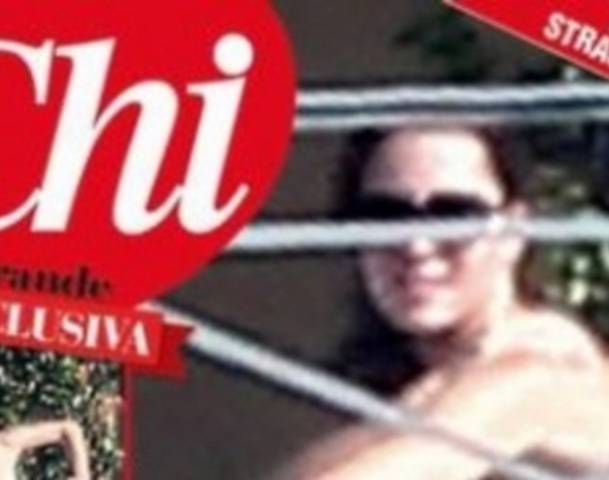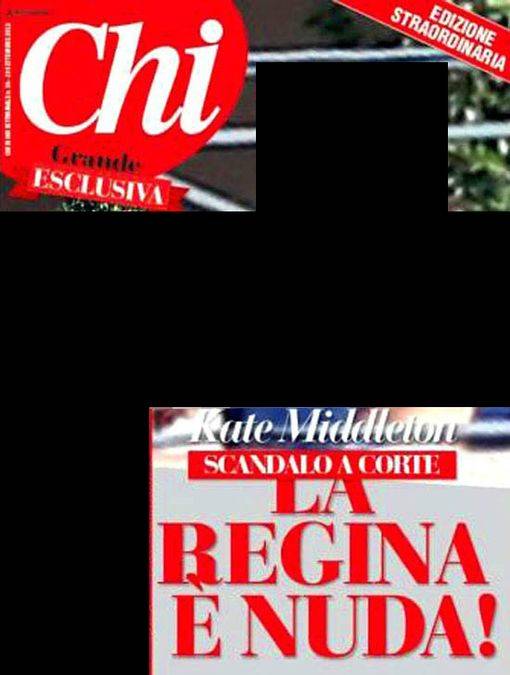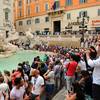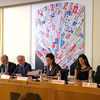Italian Politics, from Topless to Toppling
ROME - Who'd have ever thought that a photo of a topless princess could bear reflections on Italian politics? Italian political analysts, that's who, and nothing escapes their attention. So, Kate Middleton, wife of Prince William, is snapped by a paparazzo in France, and a sleazy French magazine runs the photos--not all of them, mind you, only a few. The British complain; the British press refuses to print them as an invasion of privacy; even Rupert Murdoch, who ran the photos of foolish Harry, declined to run these. At that point the English Royals announce they are suing the French magazine.
And then what happens: an Italian magazine called "Chi" buys them and prints the photos in a26-page spread which at least some of those discarded by its French counterpart in sleaze. Why should we care? Because the magazine belongs to the mega-publisher Mondadori, which belongs to former Premier Silvio Berlusconi, who remains a possible candidate to succeed today's Premier Mario Monti. In printing the photos of Kate, pundits here point out, the invasive photos risk becoming a weight on Italian diplomacy should Berlusconi is ever again a head of government. No one is forgetting his vulgar comments about German Chancellor. According to the reliable Nick Pisa, Rome correspondent for the Daily Mail of London, in early July 2011, "Mr Berlusconi referred to the then 57-year-old Mrs Merkel as ‘an un****able fat ****’." Just to spite Berlusconi, moreover, a left-leaning newspaper here has just published photos of his daughter Marina, topless.
Other fireworks involving Berlusconi come from his Mediaset company's reported bid to purchase the leading opposition TV network La7. This shoestring TV network has challenged both the three networks of the state system RAI and the trio of Berlusconi-owned Mediaset networks, and is the favorite of the Italian intelligentsia. Its popular anchorman Enrico Mentana announced Saturday night on live TV that he would resign in protest at what he considers a monopolistic maneuver.
Berlusconi himself remains a canny possible candidate to try to succeed Monti. Economist Monti is widely tipped to succeed himself either in early national general elections in November or when regularly scheduled in the Spring. The ongoing quarrel over a revised electoral law remains unresolved, and Berlusconi maintains that he will make a bid only when he knows how that proposed revised electoral law will read. But Berlusconi, pushing 76, is not out of the running, and to prove it has gone on a diet, losing 15 pounds or so. The truly nasty here, scrutinizing him Sunday as he boarded a ship out of Venice for a party-organized cruise, added that he seems to have had a new face tweak.
Spring will also bring the choosing of a new president to succeed Giorgio Napolitano, whose prestige remains high despite his stumbling over the relationship between presidency and the magistrature. In the meantime, Monti remains a possible candidate both to succeed himself as premier and to succeed Napolitano. But other names are bruited about including that of Romano Prodi. If it would be Monti, a new premier will be required, and here a certain jostling for position is already underway, with Monti's minister for industry (Ministro per lo Sviluppo Economico e Infrastruttura) Corrado Passera, 59, in pole position. Other undeclared candidates are Luca Cordero di Montezemolo, 65, industrialist, who is chairman of Ferrari and former chairman of Fiat SpA. A woman just may be in the race as well: Emma Marcegaglia, 47, former head of the national manufacturers association Confindustria, and - in recognition of her powerful family's industrial base - sometimes called "Lady Steel."
In the meantime, the left-leaning Partito Democratico (PD) is gearing up for primary elections in coming weeks. The battle is engaged between the present leadership headed by Pierluigi Bersani, party secretary, and the more boyish looking (he is 37) mayor of Florence, Matteo Renzi. Renzi's platform is essentially that it is time to kick out the old geezers. The left which Bersani, more than any other, continues to represent is, exactly as Berlusconi says, fragmented, with Nichi Vendola and Antonio Di Pietro all fighting for pieces of the same pie. Their primaries matter, for the PD leads the pack in all the national polls.
If nothing else, unlike Berlusconi's PdL, where he remains the undisputed leader, the ongoing, endless inside quarrels show a lively debate underway in the party. Nevertheless, in the PD fray Bersani seems the likely victor: according to pollster IPR Marketing, as of last month he led the pack with 39% of the vote. But Renzi was not all that far behind with 30%, followed by Vendola, 25% (see www.sondaitalia.com). Among the others, as of last week Berlusconi's PdL had regained some of its lost consensus, and now stands at around 20% of the electorate, while the more radical Beppe Grillo, comic and politician, has dropped from his summer peak of 19% to 15% in mid-September.
On the other hand, a substantial majority of voters tell pollsters that they are either uncertain about their vote, will throw away their ballots or stay home. At the moment, the winning coalition, which accounts for well over half the voters, is composed of indifference and disgust with all the parties, seen as toppling over under their own weight.







































i-Italy
Facebook
Google+
This work may not be reproduced, in whole or in part, without prior written permission.
Questo lavoro non può essere riprodotto, in tutto o in parte, senza permesso scritto.